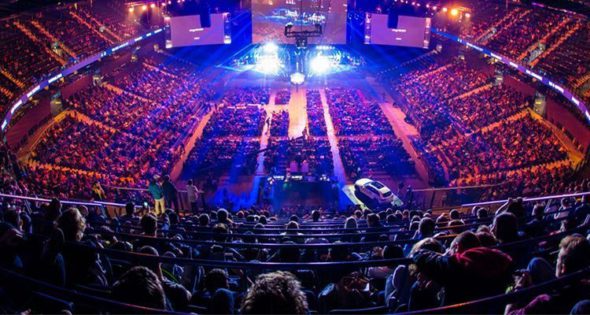The Incredible Rise of Esports

The world of competitive gaming, known as esports, has undergone a transformative journey from niche hobby to a global phenomenon. This meteoric rise has catapulted esports into the mainstream, capturing the attention of millions of fans worldwide and reshaping the landscape of both entertainment and competitive sports. Today, esports stands as a multi-billion-dollar industry, boasting professional leagues, international tournaments, and a dedicated fanbase that rivals traditional sports in fervour and engagement. This article explores the factors behind the rise of esports, its impact on the gambling industry, and what the future holds for this burgeoning industry.
Early Beginnings and Evolution
Esports’ origins trace back to the early days of video gaming, with competitive gaming scenes emerging around popular arcade games in the 1980s. However, it wasn’t until the advent of the internet and online multiplayer games in the late 1990s and early 2000s that esports began to take its current form. Titles like “StarCraft,” “Counter-Strike,” and “Warcraft” became the foundation of early esports competitions, drawing players and spectators alike. The subsequent years saw a proliferation of games across various genres, including multiplayer online battle arenas (MOBAs) like “League of Legends” and “Dota 2,” and first-person shooters such as “Overwatch,” further fueling esports’ growth.
Mainstream Recognition and Expansion
A pivotal factor in the rise of esports has been its embrace by mainstream media and the broader entertainment industry. Major broadcasters and sports networks began airing esports competitions, while streaming platforms like Twitch and YouTube Gaming provided a direct connection between players and fans, offering live broadcasts, content creation, and community interaction. This visibility helped legitimise esports as a genuine form of competitive entertainment, attracting sponsorships, investments, and partnerships from well-established brands and sports franchises.
Esports Tournament Betting
The integration of esports betting into the offerings of independent casino sites has significantly broadened the horizons of both the gambling and competitive gaming industries. These platforms have quickly recognized the immense popularity and viewership of esports tournaments, capitalising on the opportunity to offer extensive betting markets on major competitions across games like “League of Legends,” “Counter-Strike: Global Offensive,” “Dota 2,” and many others. This development has not only attracted traditional sports bettors to the dynamic world of esports but also introduced gaming enthusiasts to the thrill of betting. Independent online casinos, operating beyond the confines of more traditional betting platforms, are able to offer a wide array of betting options, from match winners and tournament victors to more nuanced bets like first kill and map victories. This extensive coverage of esports tournaments enhances the viewing experience, adds an additional layer of excitement to the competitions, and opens up new revenue streams and engagement opportunities for the burgeoning esports industry.
The prize pools available at esports tournaments have reached staggering amounts, reflecting the immense growth and financial health of the industry. Competitions such as The International for “Dota 2” and the “Fortnite” World Cup have set new benchmarks for esports earnings, offering prize pools that rival, and sometimes surpass, those of traditional sports tournaments. For instance, The International has consistently broken records, with prize pools funded through crowd-sourcing methods like in-game purchases, showcasing the community’s willingness to support their favourite games and players. These substantial rewards not only underscore the legitimacy and competitive rigour of esports but also attract top-tier talent, encouraging players to pursue professional gaming as a viable career. The allure of such significant financial rewards has further elevated the status of esports, drawing attention from mainstream media and sponsors and cementing its place in the global sporting landscape.
The Global Esports Economy
Esports has evolved into a lucrative industry, generating revenue through various channels, including advertising, sponsorships, media rights, merchandise, ticket sales, and in-game purchases. Major global tournaments, such as The International for “Dota 2” and the “League of Legends” World Championship, offer prize pools in the tens of millions, drawing competitors and spectators from around the world. The industry’s economic impact extends beyond direct revenue, stimulating growth in related sectors such as game development, event management, and digital broadcasting.
Cultural Impact and Acceptance
The cultural impact of esports is profound, influencing not just gaming culture but broader societal norms around entertainment, competition, and community. Esports has fostered a unique and inclusive community, uniting people across geographical, cultural, and linguistic barriers. Moreover, its rise has challenged traditional notions of sports and athleticism, promoting a digital, strategy-focused form of competition that requires teamwork, critical thinking, and reflexive skills.
The Future of Esports
Looking ahead, the future of esports appears bright, with projections pointing to continued growth in audience size, revenue, and cultural influence. Technological advancements, such as virtual reality (VR) and augmented reality (AR), hold the potential to further revolutionise the esports experience, offering even more immersive and engaging ways to compete and spectate. Additionally, as educational institutions and governments begin to recognize and support esports, its legitimacy as a career and competitive discipline will likely strengthen.
Conclusion
The rise of esports from a niche pastime to a mainstream spectacle represents a remarkable chapter in the evolution of digital entertainment. With its vibrant community, economic vitality, and cultural significance, esports has firmly established itself as a cornerstone of the modern competitive landscape. As it continues to grow and evolve, esports promises to redefine entertainment, competition, and community in the digital age, ensuring its place in the pantheon of global sports for years to come.





No Comments